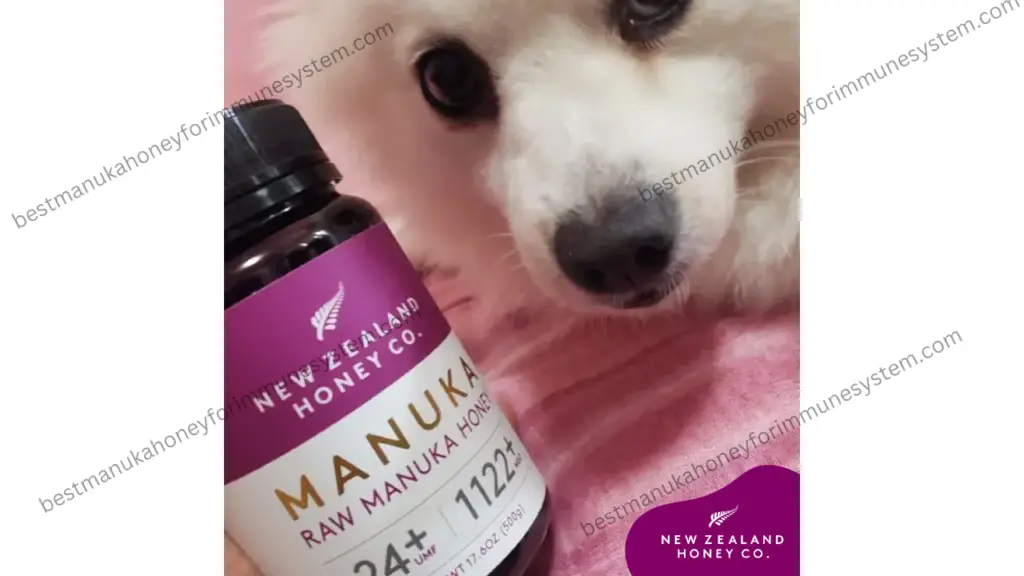Can Manuka honey be used for pets, like dogs or cats? Some people say that Manuka honey is a great way to keep their pet’s coat healthy and shiny.
Others claim that it can help with hot spots and itchy skin. There is even some evidence that it can help animals with digestive issues.
So, what is Manuka honey and why do people think it is good for pets? Manuka honey comes from the nectar of the Manuka tree, which is native to New Zealand.
Honey has unique anti-inflammatory, antibacterial, and gut-healing properties. This makes it a popular natural remedy for a variety of human ailments.
Some pet owners believe that Manuka honey can help their animals in the same way. For example, they may give their dog a small amount of honey to help with an upset stomach or rubbed onto their skin to soothe a hot spot.
There is no scientific evidence to back up these claims, but many pet owners swear by the benefits of Manuka honey.
Benefits of Manuka Honey for Pets
Manuka honey comes from the nectar of the Manuka tree, which is native to New Zealand. The honey is known for its antibacterial and anti-inflammatory properties, and it’s also thought to be a natural wound healer.
There are a few ways you can use Manuka honey to help your furry friend. For example, if your dog or cat has a minor cut or scrape, you can apply a small amount of Manuka honey to the area to help speed up the healing process.
If your pet is suffering from allergies, Manuka honey can also be helpful. The honey can help to reduce inflammation and irritation caused by allergies, and it can also help to boost the immune system.
You can give your pet Manuka honey orally or topically. If you’re giving it to your pet orally, start with a small amount and increase as needed. If you’re using it topically, apply a small amount to the affected area and cover with a bandage.
As with anything, start with a small amount and increase as needed. And, as always, consult with your veterinarian before starting any new treatments, especially if your pet has a medical condition.

Safety Considerations for Giving Manuka Honey to Pets
The short answer is yes, Manuka honey can be given to pets. However, as with anything else, there are some safety considerations to take into account.
For example, Manuka honey should not be the only thing a pet eats. Pets need a balanced diet in order to stay healthy, and Manuka honey should only be given as a supplement, not as a replacement for other food.
In addition, Manuka honey should not be given to pets who are diabetic. This is because honey contains natural sugars which can cause a spike in blood sugar levels.
If you are unsure whether or not your pet has diabetes, it is best to check with a vet before giving them any honey.
Finally, as with any new food, it is always best to start off slowly when introducing Manuka honey into a pet’s diet. This will give their digestive system time to adjust and make sure they don’t have any negative reaction to the honey.
Overall, Manuka honey is generally safe for most pets. Just be sure to use common sense and always consult with a vet if you have any concerns.
How to Choose the Right Manuka Honey for Pets
Manuka honey is a type of honey that is produced in New Zealand. It is made from the nectar of the Manuka tree and has unique antibacterial and healing properties.
Manuka honey can be used for a variety of different purposes, including treating wounds, digestive issues, and infections. It can also be used as a natural sweetener or added to food and beverages.
So, can Manuka honey be used for pets, like dogs or cats?
The short answer is yes, Manuka honey can be used for pets. However, it is important to choose the right type of Manuka honey for your pet, as not all Manuka honey is created equal.
When choosing Manuka honey for pets, you want to make sure you select a product that is pure, unadulterated, and contains a high concentration of Manuka pollen.
You also want to make sure the honey is from a trusted source and has been tested for quality and safety.
The best way to ensure you are getting high-quality Manuka honey for your pet is to buy from a reputable source. We recommend Manuka Health, as their products are pure, unadulterated, and meet all of the above criteria.
Now that you know how to choose the right Manuka honey for your pet, go forth and enjoy the benefits of this amazing honey!
Manuka Honey for Dogs

Manuka honey can be used for dogs and cats. Manuka honey has many benefits for pets, including being a natural antibacterial and anti-inflammatory. It can help heal wounds and soothe skin conditions.
Manuka honey can be used topically on dogs and cats, or it can be given orally. When using Manuka honey topically, it is best to apply it to a bandage or gauze pad and then wrap it around the affected area. For oral use, Manuka honey can be added to your pet’s food or water.
If you are considering giving Manuka honey to your pet, it is important to talk to your veterinarian first. Manuka honey is safe for most dogs and cats, but it is always best to get the OK from your vet before giving it to your pet.
Manuka Honey for Cats

Manuka honey can most definitely be used for pets! In fact, Manuka honey is a great natural remedy for a number of different ailments in both dogs and cats.
For example, Manuka honey can be used to treat hot spots on dogs and cats. Hot spots are common skin irritation spots that can be very painful for your pet.
Simply apply a small amount of Manuka honey to the affected area and let it work its magic! The anti-inflammatory and antibacterial properties of Manuka honey will help soothe the skin and speed up the healing process.
Another great use for Manuka honey is as a natural treatment for allergies. If your dog or cat is prone to allergies, you can give them a small amount of Manuka honey each day to help build up their immunity.
Not only will this help to lessen the severity of their allergies, but it can also help to prevent them from getting allergies in the first place!
And last but not least, Manuka honey can also be used to treat digestive issues in dogs and cats. If your pet is suffering from diarrhea or vomiting, a small amount of Manuka honey can help to settle their stomach and get things back to normal.
So, as you can see, Manuka honey is a great natural remedy for a number of different ailments in both dogs and cats. If you’re looking for a safe and effective way to treat your pet’s ailments, give Manuka honey a try!
How to Administer Manuka Honey to Cats and Dogs
Yes, Manuka honey can be used for pets, like dogs or cats. Here’s how to administer it to them:
For cats:
1. Put a small amount of honey on your fingertip.
2. Gently rub the honey onto your cat’s gums and tongue.
3. Repeat this process once or twice a day, as needed.
For dogs:
1. Mix honey with a little bit of water to make a syrup.
2. Put the syrup on your dog’s food or in his water bowl.
3. As with cats, repeat this process once or twice a day, as needed.
When using Manuka honey for pets, be sure to choose a high-quality honey that is appropriate for their needs.
Some brands of honey are better for certain conditions than others, so it’s important to do your research to find the best one for your pet.
Potential Side Effects from Manuka Honey for Pets
While Manuka honey is generally safe for consumption, there are a few potential side effects that could occur if your pet ingests too much of it.
The first is that Manuka honey could potentially cause an upset stomach or diarrhea in your pet. If your pet ingests too much honey, they may also experience vomiting and/or excessive thirst.
Another potential side effect of Manuka honey is that it could potentially cause a drop in blood sugar levels in your pet. This is especially true if your pet has diabetes.
If you think your pet may have ingested too much Manuka honey, it is important to monitor their blood sugar levels closely and contact your veterinarian if you notice any changes.

Last, but not least, Manuka honey can also potentially interact with certain medications your pet may be taking. If your pet is taking any medications, it is important to speak with your veterinarian before giving them Manuka honey.
Overall, Manuka honey is generally safe for consumption but there are a few potential side effects to be aware of.
If you have any concerns, it is always best to speak with your veterinarian before giving your pet any type of supplement, including Manuka honey.
Precautions When Giving Manuka Honey to Pets
If you’re considering giving your pet Manuka honey, there are a few things you should keep in mind. First, make sure the honey you’re using is genuine Manuka honey.
There are a lot of imitations on the market, and you want to make sure your pet is getting the real thing. Second, start with a small amount and see how your pet reacts.
Some pets may be allergic to Manuka honey, so it’s always best to start slow. Third, Manuka honey is very potent, so don’t give your pet too much at once.
A little goes a long way! Lastly, make sure you’re buying Manuka honey from a reputable source. There are a lot of unscrupulous sellers out there, and you want to make sure you’re getting the highest quality product for your pet.
So, can Manuka honey be used for pets? The answer is yes, but make sure you take the necessary precautions. Start slow, watch for allergic reactions, and buy from a reputable source. Your pet will thank you for it!
Alternatives to Manuka Honey for Pets
As much as we love our pets, sometimes they can get sick. Just like us, they can get a cold or the flu, and sometimes they need a little something extra to help them feel better.
Manuka honey is a great natural remedy for humans, but can it be used for our pets?
The simple answer is no. While Manuka honey is safe for humans, it is not safe for pets. The reason for this is that Manuka honey contains a chemical called methylglyoxal (MGO). This chemical is toxic to dogs and cats and can make them very ill.
So, if Manuka honey is not an option for our pets, what are some alternatives?
Here are a few natural alternatives to Manuka honey for pets:
1. Coconut Oil
Coconut oil is a great natural remedy for a number of different things. It can help improve your pet’s coat and skin, and it can also help with digestion. Coconut oil is also known to boost the immune system, which can help your pet fight off illness.
2. Apple Cider Vinegar
Apple cider vinegar is another great natural remedy for a number of different things. It can help improve your pet’s coat and skin, and it can also help with digestion.
Apple cider vinegar is also known to boost the immune system, which can help your pet fight off illness.
3. Turmeric
Turmeric is a spice that has long been used in traditional medicine. It has a number of health benefits, including the ability to boost the immune system.
Turmeric can also help with digestion and can help to reduce inflammation.
4. Ginger
Ginger is another great spice with a number of health benefits. Like turmeric, ginger can help to boost the immune system and can also help with digestion.
Ginger is also known to have anti-inflammatory properties, which can be helpful if your pet is suffering from arthritis or joint pain.
5. Garlic
Garlic is another great natural remedy with a number of health benefits. It is known to boost the immune system and can also help with digestion.
Garlic is also known to have anti-inflammatory properties, which can be helpful if your pet is suffering from arthritis or joint pain.
These are just a few of the many natural alternatives to Manuka honey for pets. If your pet is sick, talk to your veterinarian about which option might be best for them.
Summary: Is Manuka Honey Good for Pets?
Yes, Manuka honey can be used for pets. It is a natural product that can help soothe and heal wounds. It can also be used to help boost the immune system and fight infection.
Also Read

